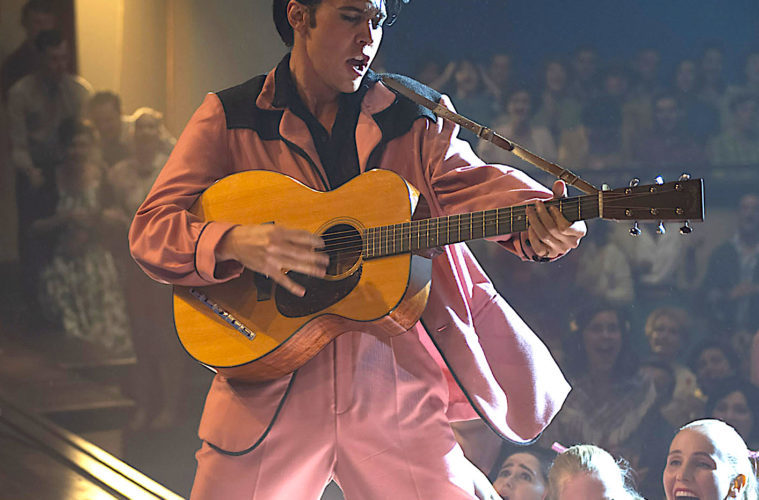Baz Luhrmann’s Elvis has a feral energy you don’t experience often in the movies; not even for a Luhrmann project (he’s a director who notoriously specializes in ostentation and glitter). A massive spectacle painted with thick brush strokes and brilliant colors, it has the depth of a soap opera, but the zeal of a symphonic masterpiece.
If you’re expecting an authentic, historically accurate portrait you’ll be grossly disappointed. This movie needed to be big so it could encapsulate its larger-than-life subject. We are talking about Elvis Presley after all, not John Denver. There’s nothing subtle about the greasy-haired kid from the South who introduced Black music to the masses before disintegrating into a blur of sequined suits and pills in Las Vegas.
Luhrmann bludgeons us with his obsession for The King, and he never tries to convince us that we’re watching anything resembling reality. From bustling Beale Street in Memphis and its sweaty nightclubs to backroad churches in the countryside, every frame pops with dreamlike surrealism.
Narrated by Elvis’ gluttonous manager, Colonel Tom Parker, played by Tom Hanks, the carnival barker’s only talent seems to be usurping money from his acts. Hidden behind layers of latex, a gargantuan fat suit and a thick Dutch accent, Hanks’ performance is as bizarre and garrulous as the rockstar fairytale itself. He’s constantly gesturing, trembling and bright-eyed, yearning for the almighty American dollar. However, at times you can see a genuinely sordid and sad soul peek through The Colonel’s pathetic need for capital gain. Hanks’ portrayal offers moments of greatness.
As the titular icon, Austin Butler (Once Upon A Time In Hollywood) chews up the screen with an authority and effervescence that’s rare for a relative newcomer. He also dances, scowls, and sings with such ferocity you’ll feel the heat sizzle off the screen. It’s an intense and bravura performance. When the movie actually gives Butler the space to discover his character, which isn’t often enough, he brings a tragic sensitivity and ire to the legend.
You probably know the story. After Colonel Parker spots the ingenue at a barnyard concert while touring with his main attraction, country singer Hank Snow, the Svengali immediately twists his mustache and plans the country boy’s career. From there, we’re thrown on a rollercoaster ride of an artist’s unprecedented rise to fame and devastating fall from grace.
Luhrmann rushes us through several stages of Elvis’ career– recording at Sun Records, signing with RCA, his somewhat Freudian relationship with his mother, and the controversies regarding his pelvic thrusts on stage, to name a few. The film is more interested in the music that molded Elvis than his actual identity. By featuring artists such as B.B. King and Big Momma Thornton, the movie tries to show that Presley wasn’t just influenced by these luminaries, but emotionally frayed by the rampant racism in the South. In actuality, the singer hardly addressed those social issues. Still, Luhrmann makes his point: Black rhythm and blues was the punk rock elixir Elvis harnessed to take over the world.
After our hero finds himself in a slump, starring in a slew of bad films, being overshadowed by the British Invasion, and weary from the Colonel’s relentless branding, Presley paves a path for himself which culminates in the ’68 Comeback Special. The filmmakers shoehorn his marriage to Priscilla Presley into the narrative, although they never meaningfully explore this relationship (or the problematic age disparity). They also soft-pedal Elvis’ drug use, his curious obsessions, his weight gain, and his ties to the Memphis Mafia, all of which led to his death at 42 years old. Luhrmann is more interested in the ebullient essence of The King and his music than the dirty details of his descent.
This glitzy and somewhat surfaced take isn’t without its own issues. There’s so much fancy camera work, cotton candy splatter and frenetic pacing, the director’s technical prowess sometimes drowns his gyrating protagonist. The first thirty minutes in particular offer an overabundance of kneejerk editing along with a cacophony of sound and feverish montages, not to mention a palette of colors that makes Tik-Tok clips look like introspective indie films. Just when you’re about to lose hope, he finds his footing and takes it down a notch, freeing himself (and the audience) from the onslaught of self-indulgence.
Even with its flaws, Elvis is a compelling and distinctive portrait of fame and its deadly trappings. It’s also Luhrmann’s vision of America, which encapsulates a melting pot-like beauty under a dark capitalist shadow. At nearly two hours and forty minutes, the film moves with a swift, thrusting power which flies by, mostly thanks to Butler. The kid is a natural. Even as we watch our hero decline in health and spirit, Butler gives him a quiet and mournful dignity that’s unforgettable. He’s the best actor to portray The King yet. You really can’t help falling in love with him.
Advertising disclosure: We may receive compensation for some of the links in our stories. Thank you for supporting Irvine Weekly and our advertisers.

